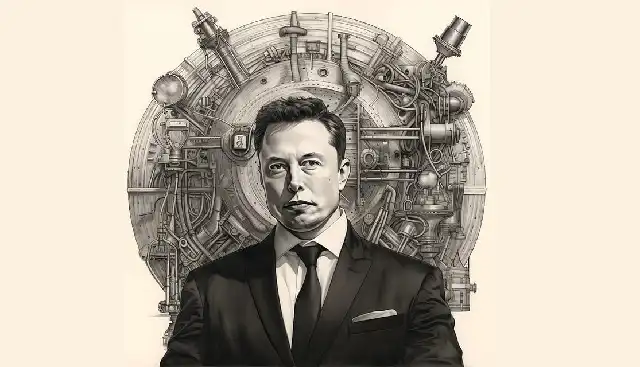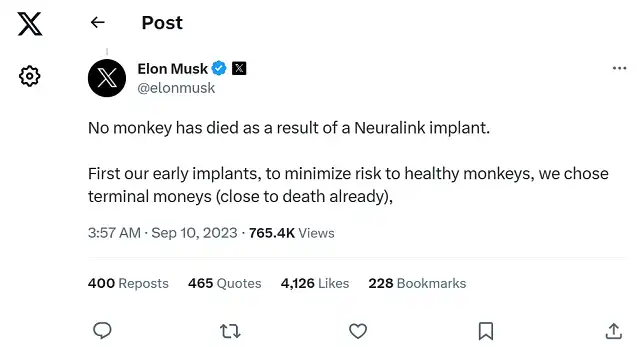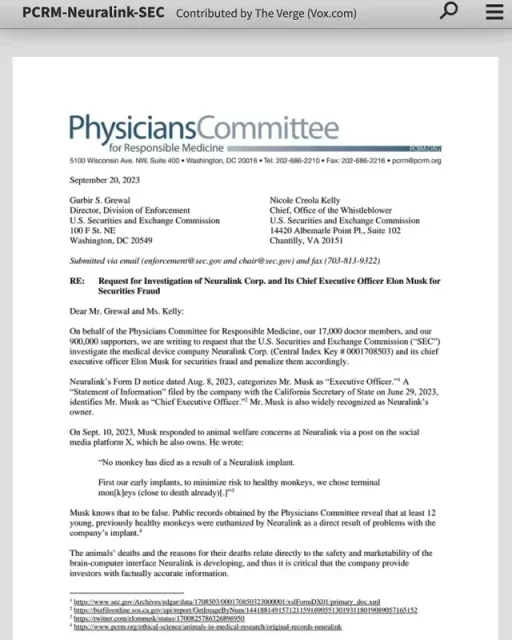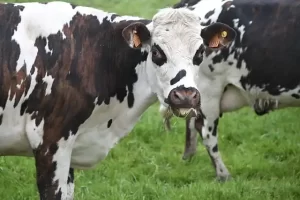Is The Human Experimentation of Musk’s Neuralink Safe?
- “Miracle Weight-Loss Drug” Sweeps Across America
- The United States Avian Influenza Outbreak Worse Than Expected?
- Global First: Bovine Avian Influenza Transmission to Humans Detected
- Potassium-Enriched Salt Substitutes: Reducing Blood Pressure Risk?
- Tritium Detection in Fukushima’s Seawater: Below Safety Standards
- What Reason Let AstraZeneca Withdraws COVID Vaccine From The Market?
Is The Human Experimentation of Musk’s Neuralink Safe?
- AstraZeneca Admits for the First Time that its COVID Vaccine Has Blood Clot Side Effects
- Was COVID virus leaked from the Chinese WIV lab?
- HIV Cure Research: New Study Links Viral DNA Levels to Spontaneous Control
- FDA has mandated a top-level black box warning for all marketed CAR-T therapies
- Can people with high blood pressure eat peanuts?
- What is the difference between dopamine and dobutamine?
- How long can the patient live after heart stent surgery?
Is The Human Experimentation of Musk’s Neuralink Safe?
Unveiling the Grim Secrets Behind Neuralink’s Monkey Deaths: Is Musk’s Brain-Machine Interface Human Experimentation safe?
On Sep 19, Elon Musk’s brain-machine interface company, Neuralink, announced that it had been granted permission to conduct its first human experiments by implanting brain-machine interfaces into paralyzed patients.
However, American media published an article on Wednesday exposing the painful deaths of monkeys during Neuralink experiments.

While Musk stated earlier this month that no monkeys had died due to Neuralink’s brain-machine interface implants, the latest reports from American media seem to contradict his claim.
Public documents obtained by the Physicians Committee for Responsible Medicine (PCRM) in the United States show that monkeys involved in previous Neuralink experiments suffered various complications, including “bloody diarrhea, partial paralysis, and brain edema,” ultimately leading to euthanasia.
The Physicians Committee for Responsible Medicine is a non-profit organization dedicated to ending live animal experiments.
Painful Animal Experiments
On September 10th of this year, Musk acknowledged for the first time on his social media platform, X (formerly Twitter), that a monkey had died. However, he stated that no deaths were caused by “Neuralink implants” and claimed that researchers carefully selected monkeys in “near-death” conditions for experiments. He had previously claimed in a speech last fall that Neuralink’s animal experiments were not “exploratory” but were meant to confirm fully formed scientific hypotheses. “We are very cautious,” he said.

Musk claimed that no monkeys died due to Neuralink implants.
However, based on public records and interviews with former Neuralink employees and current researchers at the California National Primate Research Center at the University of California, Davis, American media have painted a very different picture of Neuralink’s animal research. These records include the first publicly released veterinary records describing the horrific suffering experienced by as many as 12 primates during Neuralink experiments, all of which had to be euthanized.
Neuralink was founded in March 2017 and within less than a year, it had acquired a significant number of animal subjects for testing its brain-machine interface implants. From September 2017 until the end of 2020, the company’s experiments were conducted with the assistance of researchers from the California National Primate Research Center at the University of California, Davis, a federally funded biological research facility. Musk promised to revolutionize prosthetics, designing implants that would enable wireless communication between the human brain and artificial devices, and even between humans.
According to veterinary records from the University of California, Davis, monkeys experienced a series of complications after receiving Neuralink’s electrode implant surgery, including bleeding diarrhea, partial paralysis, and brain edema.
For instance, in an experimental surgery conducted in December 2019 to determine the “efficacy” of the device, an internal component of the implant “fractured” during implantation. Researchers observed the monkey, referred to as “Animal 20” by the University of California, Davis, at night and found it scratching the surgical site, with blood oozing from it. It also aggressively pulled at a connector, ultimately causing part of the device to be torn off. The following day, researchers had to perform surgery to address the issue, but fungal and bacterial infections had already occurred. Veterinary records indicate that both infections were unlikely to be cleared, partly due to the implant covering the infected area. On January 6, 2020, the monkey was euthanized.
Neuralink conducted experiments using monkeys
Other veterinary reports show that a female monkey named “Animal 15” died in March 2019. The report documented her condition in the months leading up to her death. A few days after the implant surgery, she inexplicably began pressing her head against the floor, which was noted as a symptom of pain or infection. Researchers observed that despite her discomfort, she continuously scratched at the implant site until it bled, often lying at the bottom of the cage, hand in hand with other monkeys.
Subsequently, “Animal 15” began losing her coordination. Researchers observed that she would uncontrollably tremble when she saw laboratory staff. Her condition deteriorated over the next few months until researchers eventually euthanized her. Post-mortem reports showed bleeding in her brain, with “localized damage to a portion of the cortex” caused by Neuralink’s implant.
Another monkey, “Animal 22,” experienced loosening of the cranial implant in March 2020 and was euthanized. Post-mortem reports indicated that two screws securing the implant to the skull had loosened to a point where they could be easily removed. The post-mortem report for “Animal 22” clearly states that “its death can be entirely attributed to mechanical failure of the implant, not an exacerbation due to infection.” If true, this seems to directly contradict Musk’s statement that no monkeys died due to the implants.
Musk claimed that Neuralink chose monkeys in “near-death” conditions to minimize risks to healthy ones. However, an anonymous former Neuralink employee disputes Musk’s claim.
The former Neuralink employee stated that Musk’s assertion is either “pure fabrication” or “absurd.” “We raised these monkeys for about a year before any surgeries were performed,” he said. The project required up to a year of behavioral training, so monkeys in near-death conditions did not meet the time span requirements.
A current doctoral candidate conducting research at the California National Primate Research Center also questioned Musk’s statement. “These are very young monkeys; it’s hard to imagine that these not-yet-adult monkeys would be near death for some reason,” he said.
Andy Fell, a spokesperson for the University of California, Davis, declined to comment on Musk’s statements when interviewed.
Regulatory Investigation
On Wednesday afternoon local time, the Physicians Committee for Responsible Medicine sent a letter to senior officials at the U.S. Securities and Exchange Commission (SEC), calling for an investigation into Musk’s statements.
The records mentioned above could serve as the basis for an SEC investigation into Musk’s statements regarding Neuralink’s primate deaths. As Neuralink progresses toward its goal of releasing the first commercial brain-machine interface, the company has faced multiple federal investigations.

The Physicians Committee for Responsible Medicine asserts that Musk’s statements about Neuralink’s primate deaths are misleading, and he knew these statements were “false.” They believe that investors should be aware of the safety and marketability of Neuralink’s speculative product. “They claim they are bringing a safe device to market, and that’s why you should invest,” said Ryan Merkley, responsible for animal experimentation alternatives research at the Physicians Committee for Responsible Medicine. “We believe he’s lying to cover up what happened in Neuralink’s exploratory research.”
Musk’s posts about Neuralink’s monkeys on X have been viewed over 760,000 times. In their letter to the SEC, the Physicians Committee for Responsible Medicine pointed out that when the SEC charged Musk with securities fraud in 2018, it considered Musk’s social media accounts as a news source for investors. The SEC has jurisdiction over the sale of any securities, including those issued by privately held companies like Neuralink. Recent filings show that the company has raised over $280 million from external investors.
If the SEC indeed investigates Musk’s statements, this would be at least the third federal investigation Neuralink faces related to animal experiments. In December 2022, the Office of Inspector General of the U.S. Department of Agriculture launched an investigation into Neuralink’s treatment of some
animal test subjects. In February 2023, the U.S. Department of Transportation initiated an investigation into Neuralink, alleging unsafe transport of antibiotic-resistant pathogens.
As of the time of publication, the SEC declined to comment on the letter from the Physicians Committee for Responsible Medicine. Neuralink has not responded to Musk’s statements regarding the experimental monkeys or commented on the allegations made by the Physicians Committee for Responsible Medicine.
Is The Human Experimentation of Musk’s Neuralink Safe?
(source:internet, reference only)
Disclaimer of medicaltrend.org
Important Note: The information provided is for informational purposes only and should not be considered as medical advice.



